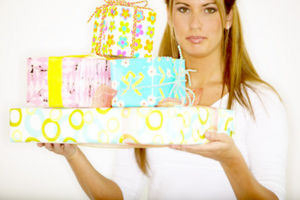Re-Gifting
From Giftypedia
Regift: (verb) To give an unwanted gift to someone else; to give as a gift something one previously received as a gift. [1]
Although the word “regift” first came into popular use from an episode of “Seinfeld” [2], the concept of re-gifting has been around much longer. Is regifting acceptable? For those who think the practice of regifting as tacky - it is now a widely accepted practice and by no means implies how gifty you are, or are not. In a Harris poll taken in August 2006, 52% of the people surveyed reported regifting in the past and had plans to do so in the future. Seventy-eight percent of those surveyed said re-gifting was acceptable some or most of the time.[3] Even the most recent edition of Emily Post's Etiquette has guidelines when it comes to regifting.[4]
Regifting Etiquette
If you are planning on regifting a gift, there are several rules of regifting to keep in mind:
- Take out the previous gift card. How would you feel if you were to receive a gift with a card saying "To Jane, From Ellen", and your name is Mary?
- Update the wrapping. Nothing is more tacky than receiving a gift with crinkled, used wrapping paper or wrapping paper from the wrong season or occasion. You saved money by re-gifting, so make the gift special with creative wrapping.
- Item must be in good condition. Items that have been recently received and never been opened are acceptable for regifting. If you have to blow dust off the box, the item may be too outdated to give to someone.
- No hand-me-downs. There is a difference between regifting an item versus giving something used and well-worn.
- Clean your re-gifts. Re-gifting an appliance is fine, but make sure the gift is clean and presentable. No one wants a Crock-Pot with used bits of food.
- Make sure the gift is something the recipient will like. Re-gifting can be a great idea when you give something you know the recipient will enjoy.
- Keep track. Nothing would be more embarrassing than sending a gift to someone who sent it to you in the first place. Similarly, it's also a good idea to avoid re-gifting an item to someone within the same circle of friends of the person who had originally given the gift to you.
- Avoid expensive jewelry. More often than not, pricey jewelry is bought specifically for a certain person in mind.
- NEVER re-gift the following: Candles, soap, obscure music, fruitcake, personalized items, items with company logos, free/promotional gifts, bootleg DVD's, partially used gift certificates/gift cards, handmade items, family heirlooms, or anything else that indicates that you put no thought whatsoever into what you were regifting. On the other hand, gift cards that have never been used can be re-gifted. Also, wine and champagne are popular items to regift, especially during the holidays.
- Re-Regifting: Returning a re-gifted present. If someone gives you an obviously re-gifted present, like a personalized wedding gift, wait until you need to give that person or couple a gift, then give it back. Re-wrap it, of course, and remove any card that may have been with the original gift. It may seem awkward, but it will be less embarrassing for both parties involved than to return it outright.
Regifting even has it's own national holiday, National Regifting Day [5] is celebrated the Thursday before Christmas. At your next event make regifting part of the fun, by playing a gift exchange game like a Yankee Swap or White Elephant party. Let everyone know to only bring gifts that are candidates for regifting. Regifting can be a relatively painless experience for all if it is done right. Avoiding being crass and tacky when it comes to regifting may be the best tip of all.
Related Guides
References
- ↑ Regift
- ↑ Seinfeld Scripts
- ↑ Regifting Survey
- ↑ Emily Post's Etiquette Book
- ↑ National Regifting Day



 Printer Friendly
Printer Friendly
